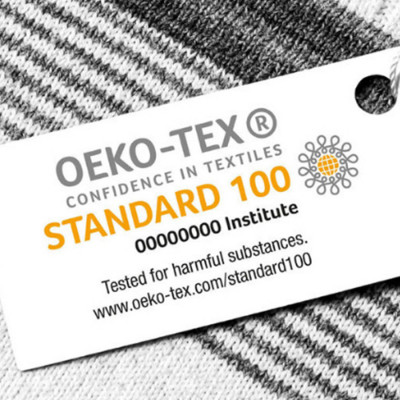Standard 100 by OEKO-TEX®:
What Does It Certify and Why Is It Needed?
The OEKO-TEX® STANDARD 100 is one of the world's best-known labels for textile and yarnя which have been tested against harmful substances.
It ensures the high product safety and builds client trust.
Here, you will find more about STANDARD 100 and why it is good to check for the presence of this quality label on the textile or yarn which you are buying.
What Does STANDARD 100 by OEKO-TEX® Mean?
If the textile product is labelled with the STANDARD 100 quality label, this is a guarantee that all of its components, i.e. fibers, buttons or other accessories have been tested against harmful substances and that the final product has been found to be safe to human health.The test is carried out by OEKO-TEX® independent partnering institutes on the basis of the OEKO-TEX® extensive criteria catalog. The catalog considers a number of regulated and non-regulated substances which might be harmful to human health. In many cases, the limit values set out in STANDARD 100 are stricter compared to the national and international requirements. The criteria catalog is updated at least once a year, and is expanded and supplemented in accordance with the new requirements.
Manufacturers and their clients may find it difficult to keep themselves informed about the legislative requirements referring to harmful substances on a daily basis. This is where the OEKO-TEX® set in motion.
What Items Can Be Certified?
In general, all textile items at each stage of their processing (starting with the textile fiber and yarns and ending with the final product) are suitable for a STANDARD 100 certification.
Every single component and ingredient is tested according to a modular system prior to granting the STANDARD 100 label. This includes threads, fibers (yarns), buttons, zip fasteners and linings. You might find it interesting that even the prints and the top cover materials of the final product are also tested against harmful substances in accordance with the applicable criteria. All the products carrying the STANDARD 100 label, whether baby fabrics, clothing, home textile or decorative items, clearly signal trust.можете да се доверите.
Which Are the Product Classes That Receive the STANDARD 100 Label by OEKO-TEX?
The product class is a group of products classified depending on their functions. For each product class, different requirements are applied and hence, different limit values.
Product Class 1: it includes baby products and features the strictest requirements and limit values. In the general case, yarns also belong to this group.
Product Class 2: it includes products intended for direct contact with the skin such as shirts, underwear, mattresses, etc.
Product Class 3: it includes products which are not intended for direct contact with the skin, or if any, it is minimal, such as jackets, cardigans, belts, etc.
Product Class 4: it includes decorative items – all items including primary products and accessories used for furnishing such as tablecloths, curtains, furnishing fabrics, etc.
What Are the Benefits for the Manufacturers and Their Textile and Yarn Brands?
We all know that building one’s own quality reputation is costly. This is where the OEKO-TEX® independent institutes come into play offering customized and practical solutions. With their help, every brand can better its manufacturing processes and product quality.
The STANDARD 100 certification is an investment in the trust towards your company and products (yarns) which you manufacture. It ensures your company’s strong and professional presence on the global market.
With their help, every brand can better its manufacturing processes and product quality.
Customers these days are becoming to value product quality more and more. With all the product diversity, everyone is aiming to stand out by finding a distinguishing mark, an advantage which will make a product more competitive.
Source: https://www.pleta.bg/bg/blog/view/oeko-tex100/

